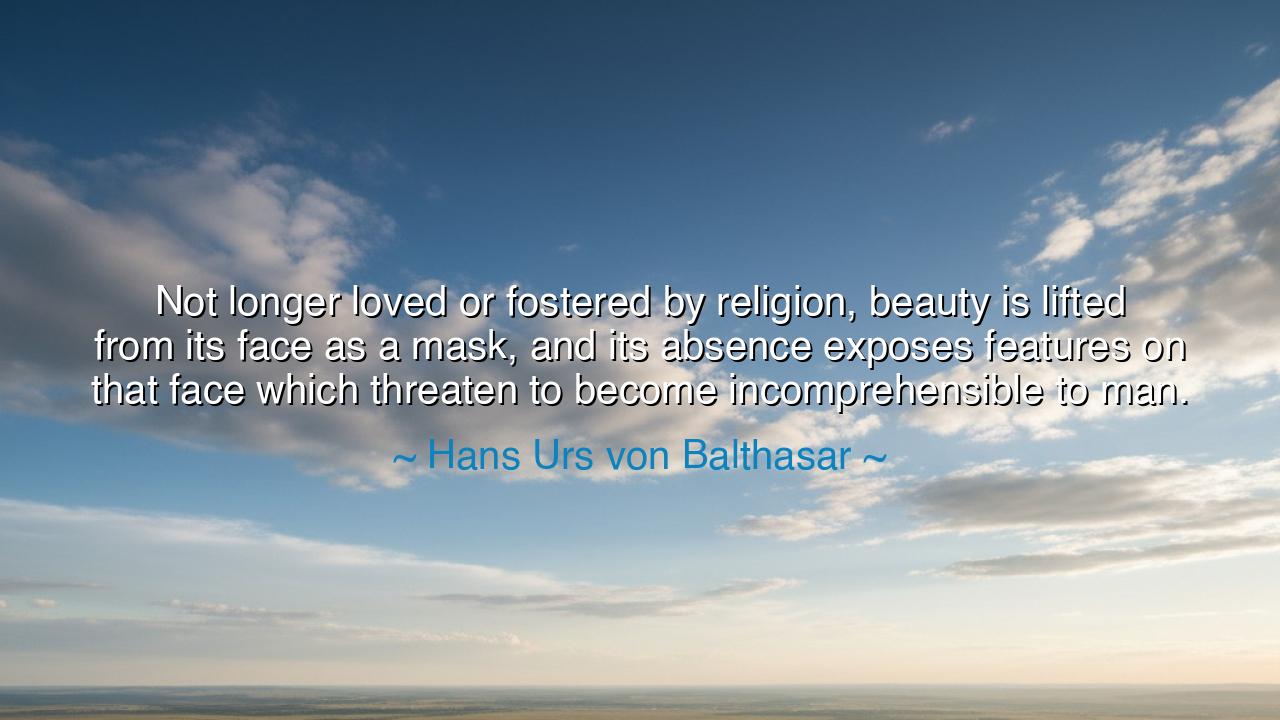
Not longer loved or fostered by religion, beauty is lifted from
Not longer loved or fostered by religion, beauty is lifted from its face as a mask, and its absence exposes features on that face which threaten to become incomprehensible to man.






Hear now, O seeker, the solemn words of Hans Urs von Balthasar: “Not longer loved or fostered by religion, beauty is lifted from its face as a mask, and its absence exposes features on that face which threaten to become incomprehensible to man.” These words ring like a bell tolling in the night, mourning not only for religion but for humanity itself. They tell us that when the sacred bond between beauty and faith is severed, the world grows hollow, and the human soul trembles before a face of reality stripped of radiance.
In ages past, beauty was fostered by religion. The hymns that rose in cathedrals, the light painted on stained glass, the soaring arches of temples—all these were not mere adornments but revelations of the divine. Through them, men and women glimpsed something greater than themselves, a harmony that whispered of eternity. When beauty and faith walked hand in hand, even the illiterate could know God through the song, the painting, the stone carved with love. Beauty was not a mask then, but a window into the sacred.
But when beauty is no longer loved, it slips away like a bride scorned, and what remains? A face cold, harsh, and alien. Religion without beauty becomes dry, hard, and lifeless—a list of rules without melody, a body without soul. And the world itself, when stripped of beauty, appears to us as meaningless matter, a heap of broken images with no order, no radiance, no invitation to wonder. Thus, the human heart, once uplifted by awe, is left bewildered, unable to read the language of existence.
Behold history’s lesson: when the iconoclasts of the sixteenth century smashed sacred art and whitewashed the walls of churches, they sought purity. Yet what they left behind was often a barren landscape where the imagination withered. In those places, the poor no longer saw heaven in colors or angels in carvings, but only bare walls, silent and accusing. Faith risked becoming incomprehensible, for the soul hungers for beauty as much as for truth.
And consider too our modern world, filled with machines, screens, and endless data. Knowledge has grown vast, power has multiplied, but without beauty, much of life feels fragmented, harsh, and overwhelming. We chase efficiency, but the music is gone; we master matter, but lose meaning. It is as Balthasar warns: without beauty, the features of life become strange, distorted, incomprehensible even to man himself.
What, then, is the lesson? That beauty is not luxury, but necessity. It is the garment of truth, the melody of goodness. To despise beauty is to despise part of the divine. To neglect it is to starve the soul. If religion abandons beauty, it ceases to nourish fully; if life abandons beauty, it ceases to be human. Therefore, let us once more love and foster beauty—in song, in art, in ritual, in simple acts of kindness that shine with grace.
Practical wisdom follows: make space for beauty in your daily life. Walk beneath the sky with reverence. Listen to music not as background, but as revelation. Bring beauty into your home, not as decoration alone, but as a reminder of the sacred. Support art that uplifts, not degrades. And when you worship, seek the beauty that leads the heart toward awe, not mere efficiency of ritual.
Thus, O traveler of time, remember this: truth without beauty is heavy; goodness without beauty is stern; but beauty unites them, making truth radiant and goodness lovable. If you would keep life from becoming incomprehensible, then guard beauty as a sacred flame, and let it shine upon your path. Only then will the face of reality appear not as mask, but as revelation, calling you into the mystery of the Eternal.






AAdministratorAdministrator
Welcome, honored guests. Please leave a comment, we will respond soon